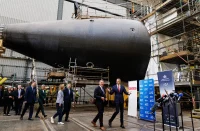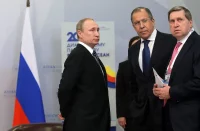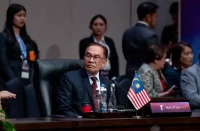To begin with, I need to briefly describe a new problem that Russia encountered in the first decade of the 21st century and which promises to become central to its foreign trade and foreign policy. Western civilization has lost its former economic and military might in recent years.
First of all, as Samuel P Huntington observed, the West’s territorial expansion peaked in 1920. At that time, the governments of the Western world controlled about 25.5 million square miles of territory, i.e., almost half of the world’s land mass. By 1993, however, the territory under their control had shrunk by half, to 12.7 million square miles. Secondly, in 1900 the inhabitants of the West comprised about 30% of the world’s total population, and Western governments governed almost 45% of its people (that percentage increased to 48% in 1920). For all practical purposes, however, by 1993 those governments ruled only the inhabitants of the West. The West’s population made up just over 13% of humanity at that time; that number has since fallen to 11% and is predicted to drop to 10% by 2025. Thirdly, the West’s share of global production reached its peak in 1928—84.2% of global output. In 1950 its share was 64%, and it had dropped to 49% by 1980. According to some optimistic forecasts, it will be 30% by 2013. And so forth.
East Asia is currently striving to take the place of Western civilization in human economics. The day is not far off when some East Asian countries will claim their right to the West’s place in the military and political organization of humanity as well. Therefore, we need to ask ourselves: what will Russia’s role be in the new international economic and political configuration? After finally deciding to become part of Europe, will we ultimately have to turn around and learn thousands of Chinese characters?
There is yet another nuance, and one that Russia frequently does not consider. In its rise to the heights of power, the West has not been overly concerned about the means it chose. The most remarkable thing is that the use of arms has not been its worst sin.
The West’s main problem is that it believes itself entitled to impose its perception of the world on the peoples of the planet, i.e., what God to worship, how to build family relations, how to live correctly, what to eat and drink, how to dress, etc. That sort of thing gets on people’s nerves, of course.
The well-known political analyst and professor at the Moscow State Institute of International Relations, Oleg Arin, points out that East Asian leaders are most upset by Americans’ constant harping on “human rights” and “democratic values,” which people in the United States understand to mean American values. In his book The Asia-Pacific Region: Myths, Illusions and Reality, he writes, “They [the East Asian leaders] are in full agreement on these issues because they understand that the introduction of “American values” into their societies could only destroy them, as happened with Russia.”Even Japanese politicians, who tend to be cautious in statements toward the West, have no illusions about those values. For example, in his conversation with Chinese Prime Minister Li Peng, Mohiro Hosokawa stressed that “Western countries should not impose their democratic values on other nations.”
The West annoys people not just with its mentoring tone, but with its sleazy political tricks (exporting revolutions), and its business activities as well. The Opium Wars in China that ended with Great Britain winning the right by force of arms to freely traffic drugs in that country are a good example of that.
Such things are not forgotten.
With the economic, military, political and cultural importance of Western countries waning, Russia’s identification with that world is becoming a dangerous and shortsighted affair. Everything leads us to draw a simple and straightforward practical conclusion. If Russia wants to enter the East Asian community as a partner—and it does—it needs to distance itself from the West as much as possible and not attempt to copy Western models in its foreign policy.
Let’s now consider some events of the recent past. After the Soviet Union collapses, Russia virtually abandoned its East Asia policy vector for a time. The Russian leadership focused most of its attention on the United States and the European Union. In addition, the Russian Pacific Fleet was significantly weakened during the 1990s for a variety of reasons. It ceased being a strategic blue water navy and was reduced to functioning as a Coast Guard, barely controlling the Okhotsk Sea and the Sea of Japan.
Thus, the following military-political configuration had developed in East Asia by the end of the 1990s and continues until the present.
The United States became the sole military hegemon in East Asia, and Japan and the Republic of Korea directly support it in the region. The objective of that alliance is to counter the growth of Chinese and Russian military power in the Asia-Pacific region. Russia currently has a negligible military presence in East Asia, especially after the Minsk and Novorossiysk aircraft carriers were sold for scrap in the early 1990s and the Cam Ranh Bay naval base was turned over to Vietnam in 2001.
The existing system is very satisfactory for Japan, which is pursuing its own goals in East Asia, and its alliance with the United States is helping it to achieve those goals. Japan is particularly interested in seeing China’s role reduced and having the confrontation between North and South Korea continue. A united Korea would be a powerful anti-Japanese force. South Korea at present is pursuing—and most likely will continue pursuing—a policy of “follow the leader,” which currently is the United States. Its foreign policy may change as the United States grows weaker in the future.
China has an interest in breaking the US hegemony in East Asia. An end to that hegemony would allow China to solve the “two Chinas” problem, i.e., the Taiwan issue. Control of Taiwan would give China unimpeded access to the world’s oceans, along with all of the opportunities that entails.
ASEAN is generally satisfied with the current military-political situation. If things change, the organization could collapse due to divergent geostrategic interests on the part of individual countries. For example, Malaysia is inclined to be anti-American; most ASEAN countries are anti-Japanese; and some are also anti-Chinese. In the 1990s the Suharto regime in Indonesia unleashed an anti-Chinese campaign that reached its peak in May 1998 (when pogroms in Jakarta alone killed several thousand Chinese and demolished or burned thousands of shops, institutions, homes, companies, etc.). The Bacharuddin Habibie administration that succeeded Suharto committed itself to the “Indonesiazation” of the entire food supply chain for the population and to supporting “native” small and medium-size companies, which forced many Chinese to abandon their business operations in Indonesia.
In addition, there are internal divisions within ASEAN, the struggle for leadership between Indonesia and Thailand being one example. There are also a variety of ethnic, religious and territorial conflicts.
All of these factors, as well as territorial disputes among almost all of the countries in East Asia, make it an extremely volatile region.
For now—and I stress for now—Russia’s economic presence in East Asia is minimal. There is no doubt, however, that over time Russia’s share of the region’s energy supply matrix will grow substantially. That should influence the policies of those countries to some extent and will definitely have an enormous impact on Russia’s foreign policy. Another thing is also quite clear—Russia’s increased economic presence in the region will encounter some resistance, and I am inclined to believe that resistance will come primarily from the United States.
It is obvious today that the use of thermonuclear weapons is an extreme and probably unacceptable means of resolving conflicts. Consequently, conventional arms remain important and will continue to be so in the future. What does that mean for the diversification of Russian foreign trade towards the East? It means that as foreign trade with the East grows, Russia will also need to boost its military presence in the Far East. It will particularly need to modernize and strengthen the Pacific Fleet in order to ensure the safety of Russian trade in the region, which is known for piracy at sea and for political instability in some countries.
Strengthening Russian naval power in the Far East will not arouse kind feelings in the United States and Japan. Therefore, in order to somehow counteract their immoderate ambitions, Russia will need to establish a geostrategic partnership with China.
We need to bear this in mind. The United States is a foreign force in East Asia, and its dominance there is particularly annoying because it seems alien. The situation creates tension in the region and destabilizes it. A geostrategic alliance between Russia and China could counterbalance US influence in East Asia and lead to solving many of the problems that have built up.
Now let’s ask ourselves a very interesting question—is a Russian-Chinese alliance possible?
I think it is. And an alliance between Russia and China would not be forced but would be formed out of necessity and under the influence of external forces. Let us consider the following circumstances.
We all know that in principle Russia is not interested in a conflict with the United States, if only because it has virtually no claims against it. Russia does not claim Alaska or California; it does not intend to organize a communist revolution in North America; and it has had little interest in the African American situation for some time. Nor is China interested in a conflict with the United States; North America is one of China’s biggest markets.
A United States that has set itself the clear objective of establishing military bases all over the globe is another matter. This is a United States interested in exporting “color revolutions” to Russia and China. This is a United States that wants to export American “values” and that aspires to global hegemony and destabilization of the international situation (the current Arab “revolutions” are an example of that). Therefore, this is a United States interested in conflict with Russia and China. China and Russia ultimately are left with no choice but to combine forces in order to stand up to US hegemony.
For example, Professor Arin, who was mentioned above, sees matters like this: “Russia’s role as a meaningful entity in East Asia can be restored by strengthening its strategic partnership with China, for which the United States is also a strategic opponent… Only a combination of the economic potential of that country [China] with the strategic potential of Russia in the Far East will bring balance to East Asia’s security system. A security and cooperation agreement between China and Russia, like the US-Japanese security agreement, would cancel the American-Japanese hegemony and, accordingly, the ability of those states to dictate to other East Asian countries.”
And here is another area where I fully agree with Arin. “Washington’s strategic goals towards Russia are the same as they were towards the Soviet Union: to minimize our country’s influence in the world is much as possible. Russia was, is and will continue to be the strategic enemy of the United States… It does not matter to the United States what regime is in power in Russia: communist or capitalist. We are a “threat” to them with either. And that is very true.”
We need to clearly understand that Russia’s geostrategic location in Eurasia makes it a natural contender for a leading position in world politics and, just as importantly, a natural enemy of any country aspiring to global hegemony. Regardless of how weak Russia has become, its very existence challenges the foreign policy significance of any leading state in the international community.
Why is that so?
For the United States and Great Britain, i.e., the “Atlanticists,” that question was answered by the Atlanticists themselves in the works of Sir Halford John Mackinder, Zbigniew Brzezinski and Alfred Thayer Mahan, among others, to whom I refer the interested reader.
And just so you know… I have no reason to disagree with them.
Konstantin Penzev is a writer and historian, living in Vladivostok, the Russian Far Eastern city.
Source: New Eastern Outlook














Comments